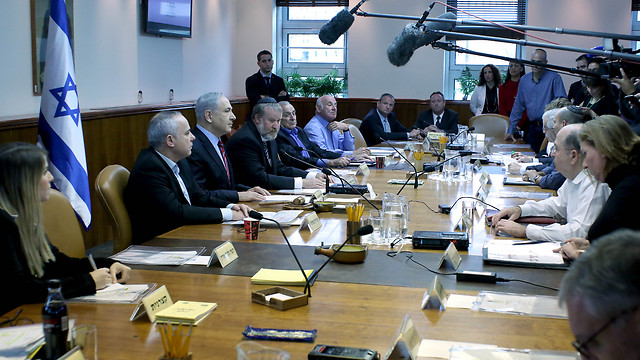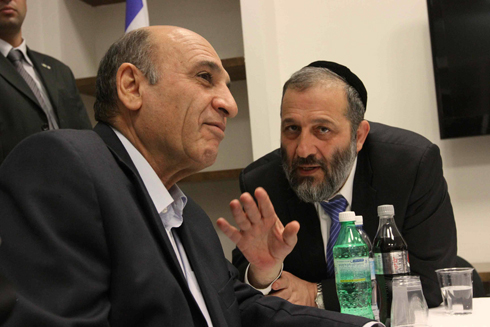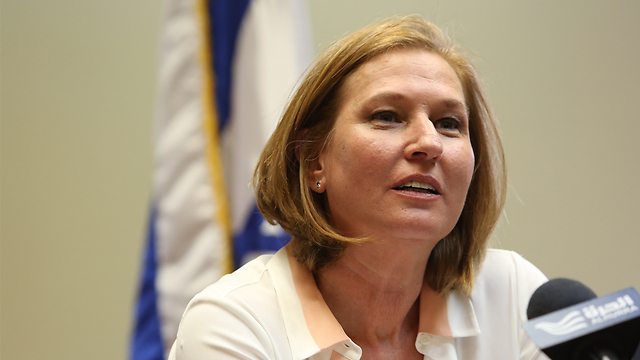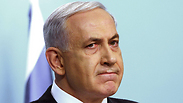
No one wants to throw Netanyahu a lifeline
Analysis: The prime minister swung from fanning the flames of election fever on Monday to a somber call for unity after Tuesday's brutal terror attack, but not one political leader in opposition is in the mood to be recruited to his cause.
1. The time of pyromaniacs
A little over 24 hours set apart the prime minister who on Monday walked into the Likud faction meeting with the dismantling of the coalition and early elections topping his agenda, and the same prime minister who faced the cameras the following evening and urged the leaders of the opposition parties, one after the other, to join a unity government.
Twenty-four hours and one terror attack made all the difference.
On Monday, the mood among the Likud faction members was one of elections. Benjamin Netanyahu walked in smug and raring to go, due both to the Israeli national soccer team's win over Bosnia, at which he was the star attraction, and also the fact that his coalition partners had just then woken up and were admitting openly that they weren't keen on elections. And when it comes to Netanyahu, when his rivals or partners – and in his case, they're one and the same – want something, it's good cause for him to do the very opposite.
Netanyahu told the faction members about the game from the night before and that he planned to attend all the matches in the future. It's important for us to be a team, too, he said to them, a united team. Just as long as we don't end up with 11 players, responded one faction member.
Netanyahu didn't speak much. He asked coalition chairman Ze'ev Elkin to outline for all those in attendance the coalition crisis surrounding the budget and so-called Nationality Bill. For his part, he expressed doubt vis-à-vis the true intentions of Yair Lapid and Avigdor Lieberman, and waved off concerns regarding the establishment of an alternative government of 61 Knesset members. Almost all those present demanded adopting a firm stance against Lapid. Don't give in to him; he can't dictate to the Likud, they said.
But the enthusiasm didn't infect everyone. With eyes still on a ministerial post under the current government, Gila Gamliel, for example, apparently saw her dreams going up in smoke. Perhaps it's best to sit down with Lapid and come to an agreement, she suggested, almost pleaded. I'm on good terms with him, she said; I think I can win him over.
The transparency bordered on the ridiculous: That's right, Gamliel, who for 18 months waged fierce battles with Yesh Atid in the Knesset Finance Committee, to the point at which Lapid demanded that Netanyahu remove her from the panel, is going to be the one to convince him to forgo his principles.
The other faction members blasted her – no compromises, they yelled. Netanyahu, too, rejected the offer. No, he said, I don't want to see any private initiatives; we're conducting the negotiations with Yesh Atid in an orderly manner.
The sense was, says one senior Likud official, that Bibi wants these elections more than anyone else. After all, he didn't appear suddenly with the Nationality Law for no reason; he thought that if he comes along with the law, Lapid and Tzipi Livni will find it hard to swallow and they'll resign. And if the coalition were to fall apart, Netanyahu would want it to do so over a rightist-national issue.
On Tuesday morning, however, Israel woke to the severe terror attack at the Kehilat Bnei Torah synagogue in Jerusalem's Har Nof neighborhood, with its five dead and eight wounded and images that awakened scenes from other times and other places in our collective consciousness. The images of the blood-stained prayer shawls and prayer books shook even those who don't remember when last they stepped foot into a synagogue.
The savage nature of the attack – individuals armed with butcher's knives – only intensified the horror. Everyone realized that we aren't dealing any longer with hit-and-run attacks carried out by a lone terrorist, that we're entering a period seeped in blood, which could spread from synagogues to anywhere else in Jerusalem. Our sense of personal security was severely undermined.
The agenda had clearly changed. And the ridiculous debate over whether or not to call it an intifada, or not just yet, but soon, again took over the discourse – as if we'd be able to deal with it better if it had a name. The serial pyromaniacs took to the airwaves and proposed various options, including the annexation of the Arab neighborhoods – or, in other words, anything and everything that it would take to set not only Jerusalem ablaze, but the entire country too.
Anything and everything aside from what needs to be done, and that is to bid farewell to what Haim Ramon referred to at the time as the "peripheral neighborhood," neighborhoods we weren't smart enough to leave on the other side of the fence previously, neighborhoods in which Israelis never step foot anyway.
At the time, when the security barrier was erected around the Shuafat refugee camp, Ramon wanted then-prime minister Ariel Sharon to take the opportunity to part ways with an additional 100,000 Palestinians. Sharon didn't rule out the idea; but citing his political situation, he said he was focused entirely on the disengagement from Gaza and didn't want to open up another front against the right-wing over Jerusalem.
On Tuesday morning, Netanyahu grasped what everyone else clearly understood – that political matters were being put on ice. When security officials voice concerns about a religious war and there are enough lunatics on both sides to enlist in one, there's no room for talk of elections.
And if no elections, then why not leverage the attack to strengthen the coalition, to bring in the ultra-Orthodox under the pretext of an emergency situation? After all, they'll be quick to jump on the bandwagon; and now let's see Lieberman says he won't be party to such a government. And if Lapid decides to pull out, let him do so; the ultra-Orthodox are already in.
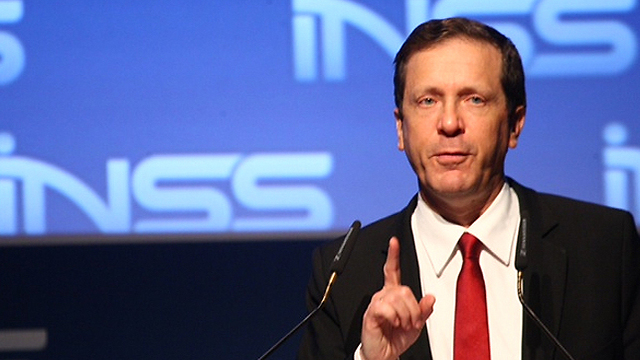
That evening, Netanyahu convened a press conference. His call for a unity government wasn't a spontaneous one. He had clearly written down the names of the party leaders he urged to join the government, lest he forget one. As if Livni isn't enough, Likudniks grumbled this week, now he's giving us Zehava Gal-On. The proposal, as it emerged from the round of talks Elkin held thereafter, was that each party would dispatch one minister-without-portfolio to form a new cabinet, a forum of party leaders in which all decisions would be made together – without budgets, without ministries, without anything.
Elkin approached all the party leaders – Isaac Herzog, Shaul Mofaz, Gal-On, Aryeh Deri, Yaakov Litzman and Moshe Gafni. Herzog issued an immediate official rejection; Gal-On said her party's answer was obvious; and all the others said they'd think it over and respond in time.
The following day, a number of them met with Elkin, but failed to offer an official response. Elkin, however, got the message: It's not going to happen; there isn't going to be a unity government, or emergency government, or whatever we call it.
It turns out there was one thing Netanyahu didn't take into account – the fact that no one would want to join his government; not even Deri, and not Mofaz either. There's nothing appealing about a conflicted and divided government that just the day before was bent on elections and is now constructing a virtual unity, a government that within the space of less than six months has proved to be incapable of providing its citizens with security, yet continues to miss every opportunity for a peace settlement.
Cutting a long story short, Netanyahu failed to consider the fact that there is no one who is willing to step in and save him from the disaster he has brought upon himself and us.
2. The time of rejection
Shas leader Aryeh Deri was approached by Elkin about joining the government after Netanyahu's dramatic address. According to Deri, he told Elkin he was tired and would deal with it the following day.
It created the impression, Deri says, that I was considering the matter, and it added weight to the proposal.
Deri met with Elkin on Wednesday. You have our utmost support when it comes to Jerusalem and the war on terror, he said to Elkin. We proved this during Operation Protective Edge. But despite understanding the need for such a government, I cannot walk into the Knesset next week and vote for a budget I don't agree with. What I also fail to understand, Deri continued, is how I, as a minister in the security cabinet, could come to the rescue of the country's security. Something smells not quite right to me. Now is not the time for politics.
I asked Deri what he thought of Netanyahu's press conference.
To each his own, Deri replied. Look, I didn't just get off the boat from Morocco. I understand what the objective was. And still, if I thought by joining the government, I could save even a single Jew, I'd overcome all the other considerations. But under the current circumstances, any change must come via elections. We've been part of the opposition for a year and a half; we can continue to be so for a few more months.
Mofaz, who was also approached, rejected the offer outright. Not a chance, he said; after the mistake I made by joining the government towards the end of its previous term in office, and with Kadima's 28 seats to boot, why would crawl back in now with just two seats?
Mofaz, a former chief of staff and defense minister, has harsh things to say. He believes we're witnessing the unfolding of a religious war, and that the terror attack at the synagogue was not the act of a terrorist who woke in the morning and decided he wanted to kill. The terror organizations, Mofaz says, were behind the attack, as part of the lack of a decisive outcome from Protective Edge.
There were suicide attacks 12 years ago too, he says; it took time, but we stopped them. We had international support back then. Today, there's nothing – nada. If nothing significant is done to stop it, we're in for a terrible conflagration.
Mofaz rejects statements made by the public security minister, who wants to see terrorists caught in the act killed on sight.
That isn't our purpose, Mofaz says. We need to prevent the attack, to stop it beforehand, not when we encounter it. And if the police can't do it, bring in the army. Let's be clear here: Someone who comes along with an ax and a knife is a suicide attacker. He doesn't care if the orders are to kill him. The solution must come from the intelligence side of things.
The prime minister asks the world to condemn it, Mofaz continues. But why should they condemn it? He isn't engaging in any political process and he's fueling the fires. We opted for the Temple Mount, the most volatile place in the world, and our pyromaniacs went up and poured oil on the flames. They talk of Mahmoud Abbas' incitement. I heard something very different from the mouth of the head of the Shin Bet security service in the Knesset Foreign Affairs and Defense Committee.
Netanyahu, Mofaz says, has become a stopper in the pipes of Israel's future that is holding up any chance of progress. Opening this blockage, he adds, requires a joint effort.
Labor leader Herzog got a call from Elkin right after the press conference. Elkin told Herzog he was looking on behalf of the prime minister into the possibility of a broad government. And what would happen next, Herzog asked; I don't foresee any possibility of a move to create change.
Immediately thereafter, Herzog issued a press release. Unity is important, he said, but we need a government that takes care of security and offers hope. The Labor Party will not sit in the government that provides neither.
The old Herzog may have responded differently. But the new Herzog is in the midst of an aggressive and personal campaign against the prime minister. Netanyahu, in any event, wasn't surprised. He thought, says a Likud source, that from a public perspective, it was the right thing to do and that he had to examine the possibility. He could have done so on the quiet, but he didn't want the move to look like a political maneuver; and that's why he first made a public appeal and only then did he dispatch Elkin.
3. The time of compromise
Over the coming days, everyone will put their differences aside. We are already seeing signs of compromise on the burning issues at hand. The problematic Nationality Law, over which Naftali Bennett had threated to resign if it isn't enacted, is gradually taking the form of a compromise: Over and above the two private-member bills on the subject, Netanyahu decided at some point to formulate a government-sponsored bill of his own, with the justice minister to work on her formulation at the same time.
But while Livni is focusing on the country's democratic identity and not its Jewish identity, Netanyahu's proposal stresses that Israel will be defined as a Jewish and democratic state, in the spirit of the Declaration of Independence, and he places the two components – Jewish and democratic state – on equal footing.
The plan is to pass the two private-member bills already on Sunday, to present Netanyahu's softened proposal, and to determine that it will eventually become a government-sponsored bill into which the private-member ones will be incorporated.
This compromise strengthens the argument that were dealing with disputes that can be resolved almost effortlessly and have become excuses for dismantling the government only to serve the motives of the parties involved.
Netanyahu met privately with Lieberman on Monday evening. The conversation took place in a different universe, the universe that was before the terror attack. Sources say that Lieberman promised Netanyahu that once they are done with the disputed issues, like the zero-VAT law and the budget, he'll give the prime minister a year of peace and quiet.
Lieberman confirms he met with Netanyahu. All he would say was that the government needs to be run correctly, that tensions are running too high and that there's too much distrust. Hopefully, he said, the mood in the wake of the security incidents will calm down and we will be able to deal with the disputes in a more serious manner.
I find it hard to believe that they're going to dealing with disputes now, says one political source. No one is in the mood for fighting among ourselves.
I told him not to despair, that the mood will return.










